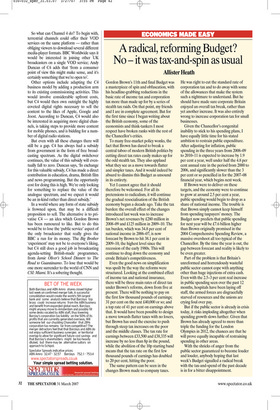A radical, reforming Budget?
No – it was tax-and-spin as usual
Allister Heath
Gordon Brown’s 11th and final Budget was a masterpiece of spin and obfuscation, with his headline-grabbing reductions in the basic rate of income tax and corporation tax more than made up for by a series of stealth tax raids. On that point, my friends and I are in complete agreement. But for the first time since I began writing about the British economy, some of the economists and think-tankers I most respect have broken ranks with the rest of the Chancellor’s critics.
To many free-market policy wonks, the fact that Brown has dared to break a central taboo of modern British politics by cutting direct tax rates easily makes up for the odd stealth tax. They also applaud what they see as a move towards flatter and simpler taxes. And it would indeed be absurd to dismiss this Budget as unsound in its entirety.
Yet I cannot agree that it should therefore be welcomed. For all its pretensions to radicalism, it will continue the gradual resocialisation of the British economy begun a decade ago. Take the tax burden: the overall effect of the changes introduced last week was to increase Brown’s net revenues by £280 million in 2008–09 and £125 million in 2009–10. The tax burden, which was 34.8 per cent of national income in 2006–07, is now forecast by Brown to hit 38.1 per cent in 2009–10, the highest level since the recession of the early 1980s. This will continue to drag down the economy and erode Britain’s competitiveness.
Even the good news on simplification was spoilt by the way the reforms were structured. Looking at the combined effect of income tax and national insurance, there will be three main rates of direct tax under Brown’s reforms, down from five at present. There will be nothing to pay on the first few thousand pounds of earnings; 31 per cent on the next £40,000 or so; and a top rate of 41 per cent on earnings above that. It would have been possible to design a move towards flatter taxes with no losers, but Brown has used the exercise to push through steep tax increases on the poor and the middle classes. The tax rate for earnings between £33,500 and £38,335 will increase by no less than 8p in the pound, while the abolition of the 10p starting band means that the tax rate on the first few thousand pounds of earnings has doubled to 20 per cent, hitting the poor.
The same pattern can be seen in the changes Brown made to company taxes. He was right to cut the standard rate of corporation tax and to do away with some of the allowances that make the system such a nightmare to understand. But he should have made sure corporate Britain enjoyed an overall tax break, rather than yet another increase. It was also entirely wrong to increase corporation tax for small businesses.
Given the Chancellor’s congenital inability to stick to his spending plans, I have equally little time for his stated ambition to restrain public expenditure. After adjusting for inflation, public spending in the three years from 2008–09 to 2010–11 is expected to increase by 1.9 per cent a year, well under half the 4.8 per cent annual rate in the period from 2000 to 2006, and significantly slower than the 3 per cent or so pencilled in for the 2007–08 financial year, which begins next week.
If Brown were to deliver on these targets, and the economy were to continue to grow at around 2.5 per cent a year, public spending would begin to drop as a share of national income. The trouble is that Brown simply cannot keep himself from spending taxpayers’ money. The Budget now predicts that public spending for next year will be £7.6 billion higher than Brown originally promised in the 2004 Comprehensive Spending Review, a massive overshoot all too typical of the Chancellor. By the time the year is out, the gap between forecast and reality is likely to be even greater.
Part of the problem is that Britain’s unreformed and horrendously wasteful public sector cannot cope with anything other than huge injections of extra cash. Even with the 2.5–3 per cent real increase in public spending seen over the past 12 months, hospitals have been laying off staff, the armed forces are disgracefully starved of resources and the unions are crying foul over pay.
But if the public sector is already in crisis today, it risks imploding altogether when spending growth slows further. Given that Brown has already agreed to more than triple the funding for the London Olympics in 2012, the chances are that he will prove equally incapable of restraining spending in other areas.
With the shrieks of anger from the public sector guaranteed to become louder and louder, anybody hoping that last week’s Budget signalled a radical break with the tax-and-spend of the past decade is in for a bitter disappointment.










































































 Previous page
Previous page